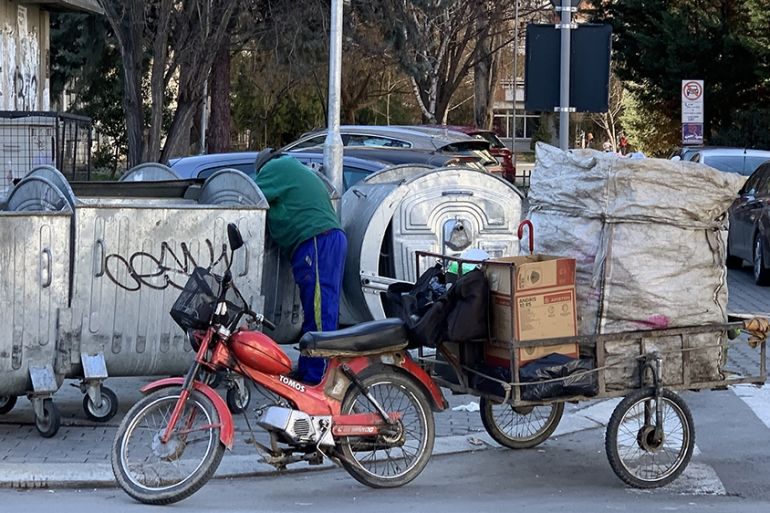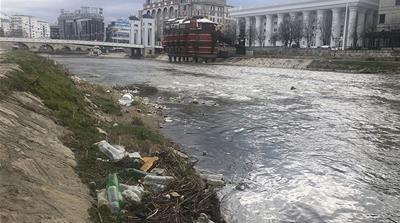Skopje’s Roma recycling collectors try to step out of the shadows
New effort seeks to formalise grey market recyclable waste collection and highlight Roma sustainability contribution.

Skopje, North Macedonia – They are focused on their work, avoiding eye contact and even friendly conversation, not that they hear much from people who typically walk past them as if they weren’t there. They don’t like being bothered as they sort through garbage bins and pluck out plastic, metal and cardboard destined for landfills or incinerators.
Their ethnic identity is easily surmised in this multicultural city, not only by appearance but by their work. By trade, they are collectors. Ethnically, they are Roma. Long scorned and marginalised – slurred by the epithet “Gypsy” – they do one of the few jobs available to them.
Keep reading
list of 4 itemsDenmark’s tough laws on begging hit Roma women with few other options
Another Roma boy dies in police chase, marking grim pattern in Greece
‘My father didn’t beat my mother in a gypsy fashion-he just beat her’
“It’s hard work. It’s dirty work,” says Sabuhan, a 35-year-old Roma who has been collecting for the past 15 years. “You do it in the summer when the sun is hot, and you do it in the winter when it’s snowing, because how else can you feed your children?”
Sabuhan is married, with two children. In a good week, he makes 50 euros ($54) collecting. He recently started working as a street cleaner in Skopje, where he lives, but the 300-euro salary ($327) is not enough to sustain his family, so he continues to collect recyclables. Despite working two honest jobs, he says he feels looked down upon by the community.
“The police, the government, the people don’t want to see me, even though I’m helping to improve their city by recycling their waste and litter,” he says.
“You can walk through the city and see the collectors everywhere, but in the eyes of the government, they are overlooked,” says Asib Zekir, the 22-year old business facilitator for the Roma Entrepreneurship Development Initiative, or REDI.
The European Commission’s North Macedonia 2019 Report stated that despite progress in closing the gap between the Roma and non-Roma in the government’s 2014-2020 Roma inclusion strategy, key benchmarks on issues like education, housing, health, and employment are still unmet. The report found that 49 percent of Roma are officially unemployed.
“The government is committed to continuously increasing funding for Roma integration policies, but the lack of expenditure monitoring, combined with the poor absorption of existing funds, remains a problem,” the report said.
Despite government efforts and European Union financial backing, a government report found two-thirds of Roma households in North Macedonia earn less than 24,000 denars (about $425) per month; half that number live on half that amount or less. The national average monthly post-tax wage is about 27,000 denars ($477).
Zekir points out that Roma are also among the most vulnerable groups in the current coronavirus crisis. Most of them live in poverty and without access to quality medical care. Informal waste collectors are especially at risk because their work requires them to be out in public, touching materials that could be contaminated. A study published in The New England Journal of Medicine found that the novel coronavirus survives more than 72 hours on plastic surfaces.
“Their health and the health of their children are at risk from going out into the field and working without safety equipment,” Zekir says. In response, he says, REDI has collected and distributed more than 1,000 sets of protective masks and gloves.

A world awash in waste
The government may be powerless to overcome one obstacle Roma collectors are facing. Since China’s 2017 “National Sword” policy abruptly blocked importation of recyclable waste from the United States and Europe – a move followed by several other countries, including Indonesia, Malaysia, and the Philippines – the global market for recyclable waste has collapsed.
A Greenpeace study on US recycling, released February 18, found that “America’s post-consumer collection, sorting and reprocessing/recycling systems are now stressed, and in some cases failing due to excessive waste generation, contamination and severe declines in commodity values for collected cardboard, paper, metal, glass and plastic materials.”
The European Parliament similarly reported at the end of 2018 that half of the plastic waste collected for recycling – itself only 30 percent of the 58 million tonnes of plastic waste generated in the EU – was exported. Having lost China as an option, the EU says “it is increasingly urgent to find other solutions”.
Yet those who rely on recycling for their survival continue collecting it.
Roughly 4,500 recycling collectors work in the grey market in North Macedonia, around 1,500 in Skopje alone, the overwhelming majority of them Roma, Zekir says. They pick recyclable rubbish from the streets and parks, and from the banks of the Vardar River winding through the capital city, mounds of bottles and cans often dotting its waterline.
Litter is a great scourge in Skopje, Zekir points out, adding wryly, “Imagine what it would be like if one day the Roma collectors decided to stop working.”
A 2018 report by the European Environment Agency (EEA) on North Macedonia criticises the lack of a “coherent national policy” to promote municipal waste recycling, and a lack of investment in recycling at the local level.
Still, the report notes that in 2015 (the most recent year for which data is available) about 44 percent of plastic waste in North Macedonia was recycled. By comparison, less than 10 percent of plastic was recycled in the US that same year, according to the US Environmental Protection Agency.
The EEA credits that difference to “the informal sector and private companies” in North Macedonia. Or stated another way, Roma collectors doing what the government cannot or will not.
“The Roma, through their collecting, clean up the city and the environment,” Zekir says. “They should not be seen as last-class citizens, but as people who work and contribute to the betterment of society.”

Out of the shadows
In late January, Zekir assembled a group of collectors to promote a plan more than a decade in the making. It seeks to take collecting from the unregulated shadows and give collectors ownership of a business that respects their contribution to society. He says the plan was enthusiastically received.
“We are finalising a business model that will provide for a healthy environment and stable employment,” Zekir says. “It will allow them to profit more from their work by eliminating layers of warehousers [who skim profits], and normalise their work through licensing and organisation. We are working in collaboration with businesses, seeking agreements with hotels and restaurants. At the same time, the government will be able to show greater levels of employment, as well as more accurate reporting of waste management and recycling, which is currently lost because collectors are unregulated. Everybody succeeds.”
The plan will require approval from the Ministries of Labour and Environment, as well as a concession from the city of Skopje to permit collectors to work in public spaces. Zekir says early government response is positive.
Zekir describes Sabuhan as a natural leader who could turn his one-man collecting into a small business with many employees. Sabuhan says he wants the opportunity to bring dignity to his work, and his community, through the initiative.
“Under our business model, they will be able to collect and sort at higher volume, generating higher revenue. With that comes more stability, better access to health, education and social services – and ultimately, integration in civil society,” he says.
Zekir’s enthusiasm for the project is not merely that of a young man in an important role, but of someone emotionally invested in its outcome.
“I drive through the city, and I see them. I have seen a woman, maybe 60 or 65 years old, walking and carrying a 25-kilo [55-lb] bag on her back. She’s walking maybe three or four kilometres [two miles or more] to drop off the bag, and then she will do it again, maybe two or three times in a day, filling up bags and dropping them off. Nobody should work so hard at that age,” Zekir says.
If his plan comes to fruition and collectors finally receive the legitimate benefits of their work, they might not have to.